Discover how AI agents automate e-commerce marketing tasks, boost ROI, and scale your business. This guide contains tools, examples, and a step-by-step setup.
Running an e-commerce business means wearing too many hats at once. You’re managing inventory, responding to customer questions, tweaking product pages, and trying to decode Facebook ads that seem engineered to drain your budget faster than you can say “conversion rate.”
If you're nodding along thinking "that's literally my life," you're in good company. Here's the thing, though - while you've been grinding through manual tasks, 69.1% of marketers have already discovered the secret weapon that's changing everything: AI agents.
AI agents are autonomous software programs that utilize artificial intelligence to perceive their environment, make decisions, and take actions without requiring constant human intervention, thereby representing a powerful evolution in AI marketing.
Unlike those basic automation tools that follow rigid "if this, then that" rules, AI agents actually think, learn, and adapt to your business needs. They're making real-time decisions to optimize your campaigns, personalize customer experiences, and scale your revenue without scaling your headaches.
Ready to discover how AI agents can transform your e-commerce marketing from a time-consuming nightmare into a profit-generating machine? Let's dive in.
What you'll discover in this guide
🧠 What AI agents actually are and why they're crushing traditional automation
🧠 5 proven ways AI agents boost e-commerce ROI with real performance data that'll make you rethink everything
🧠 The best AI agent tools for e-commerce with honest comparisons (no fluff, just facts)
🧠 Step-by-step implementation roadmap to get your first AI agent running in 30 days
🧠 Common mistakes that cost e-commerce businesses thousands in wasted ad spend
What are AI Agents in e-commerce marketing?
Let’s say you hire a marketing expert who works 24/7, never gets tired, learns from every single interaction, and gets better at their job every day. That's essentially what an AI agent is - except it costs a fraction of a human expert and never asks for vacation time.
Here's where most people get confused. They think AI agents are just fancy automation tools. Wrong! Traditional automation is like a basic calculator - it only does exactly what you program it to do. AI agents are like having a marketing genius who understands your business, learns from your data, and makes strategic decisions based on real-time insights.
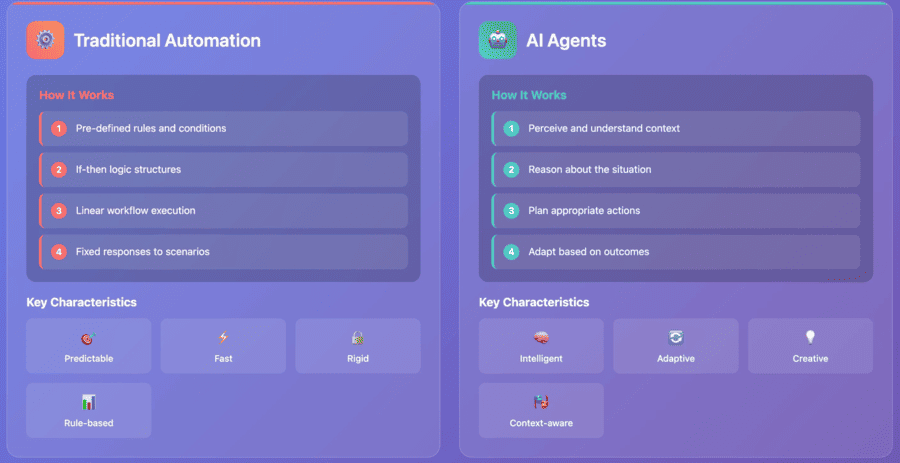
The key difference? Autonomy. While your old automation tools sit there waiting for you to tell them what to do, AI agents are actively analyzing your campaigns, spotting opportunities, and taking action to improve performance.
For e-commerce businesses, this means AI agents can:
✔️ Automatically adjust ad budgets based on performance trends
✔️ Identify which products to promote to which audiences
✔️ Optimize pricing strategies in real-time
✔️ Personalize customer experiences at scale
✔️ Predict and prevent campaign failures before they happen
Pro tip: The magic happens when AI agents learn your specific business patterns. They don't just follow generic best practices - they discover what works uniquely for your store.
5 Ways AI agents boost e-commerce performance
Now we're getting to the good stuff. Here's exactly how AI agents are helping e-commerce businesses crush their competition:
1. Automated ad optimization that actually works
Forget about manually checking your Facebook ads every morning with that familiar pit in your stomach. AI agents continuously monitor your campaigns, testing different audiences, adjusting bids, and optimizing creative elements faster than any human ever could.
The results? According to recent reports, teams utilizing AI agents have experienced productivity improvements of up to 80%. In a field test involving over 5 million ad impressions, ads featuring AI-optimized copy outperformed others in terms of click-through rate and cost per click, highlighting the real performance gains of human–AI collaboration in ad creation.

2. Dynamic pricing that maximizes profit
While you're sleeping, AI agents are monitoring competitor pricing, analyzing demand patterns, and automatically adjusting your product prices for maximum profitability. No more leaving money on the table because you forgot to check competitor prices.
And this isn't just theory—Amazon reportedly increased its revenue by 25% using dynamic pricing strategies. As your store grows larger, this kind of real-time price intelligence pays off.
3. Personalized customer journeys at scale
Instead of sending the same generic email blast to your entire list, AI agents create personalized customer experiences tailored to browsing behavior, purchase history, and engagement patterns. It's like having a personal shopper for every single customer.
4. Predictive inventory management
AI agents analyze sales trends, seasonal patterns, and market data to predict demand and optimize stock levels. No more stockouts during peak sales periods and hello to improved cash flow. They can also flag slow-moving products early, allowing you to run promotions or adjust pricing before dead stock starts eating into your margins.
5. Intelligent customer service automation
AI agents handle routine customer inquiries, process returns, and escalate complex issues to human staff - all while maintaining your brand voice. Your customers get faster responses, and your team focuses on high-value tasks.
Quick reality check 💡 Start with ad optimization - it typically delivers the fastest ROI for e-commerce businesses and requires the least technical setup.
AI agents vs traditional marketing automation: The honest truth
Let's address the elephant in the room. Most e-commerce businesses are still using automation tools from 2015 and wonder why their marketing efforts feel like pushing a boulder uphill.
Traditional automation limitations:
- Follows rigid, pre-programmed rules that break when market conditions change
- Requires constant manual updates and babysitting
- Can't adapt to new trends or customer behaviors
- Makes decisions based on single metrics instead of holistic performance
AI agent advantages:
- Learns and adapts automatically to changing market conditions
- Makes complex, multi-variable decisions in real-time
- Improves performance over time through machine learning
- Considers dozens of factors simultaneously for optimization
Real example: Your traditional automation might pause ads when the cost per click increases. An AI agent analyzes the reasons behind the increased CPC, tests different audiences, adjusts creative elements, optimizes for overall profitability, and may even discover that a higher CPC actually leads to a better customer lifetime value.
The difference is like comparing a chess computer to a pocket calculator. Both are useful, but only one can actually think strategically.
Top AI agent tools for e-commerce (2025 edition)
After testing dozens of platforms with real e-commerce businesses, here are the tools that actually deliver results (not just fancy demos):
1. Madgicx
Best for: Facebook/Instagram ad optimization and scaling
Key features: 24/7 autonomous optimization, instant Meta ad generation in batches, e-commerce-tailored templates, Shopify-integrated reporting, predictive budget allocation, and intelligent comment management.
Pricing: The All-in-One plan starts at $99/month, with a 7-day free trial.
Why it works: Built specifically for e-commerce scaling with proven ROI tracking and industry-leading AI advertising capabilities, Madgicx’s AI Marketer continuously audits your ad account 24/7 and delivers actionable recommendations you can launch with a single click. The AI Ad Generator instantly generates high-quality Meta ads in batches for instant A/B testing, helping you scale faster with AI that’s built for performance.
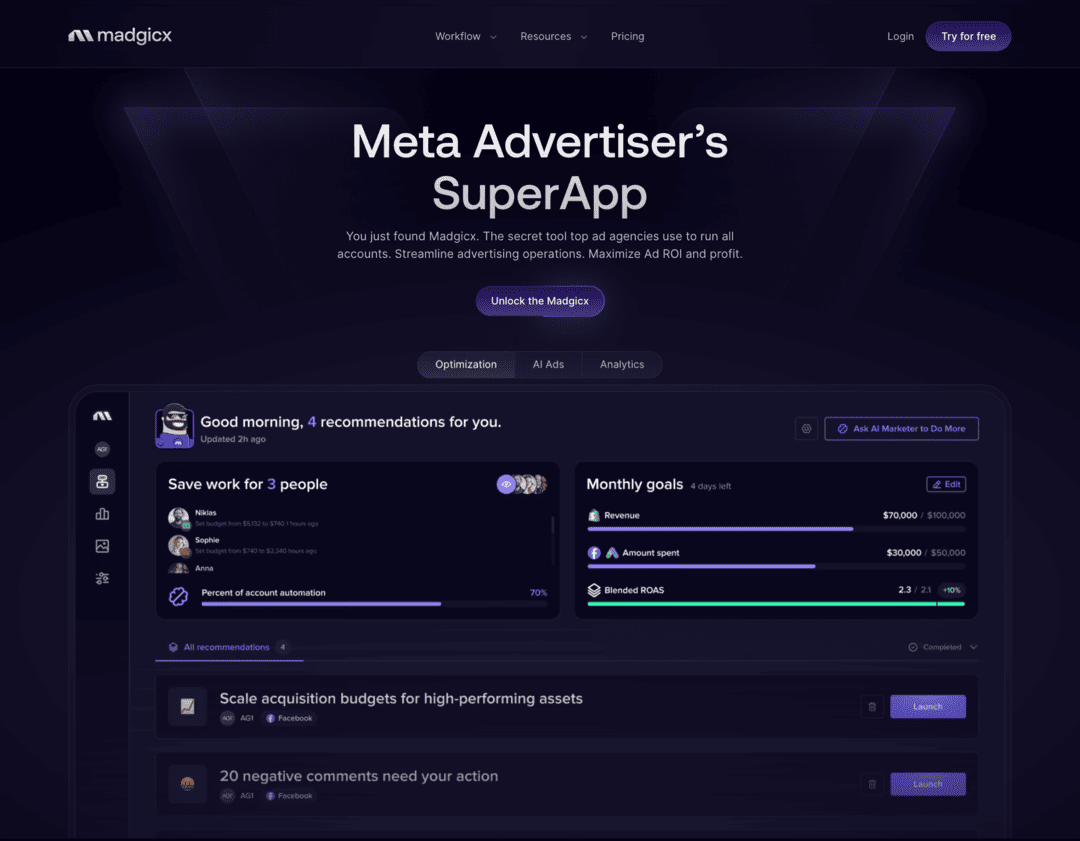
2. Klaviyo
Best for: Email marketing automation and customer segmentation
Key features: Predictive analytics, automated flow optimization, behavioral targeting
Pricing: Free plan for up to 250. Paid plans start from $20/month
Why it works: Klaviyo excels at turning customer data into revenue. Its behavioral triggers and predictive analytics help you send the right message at the right time—automatically.
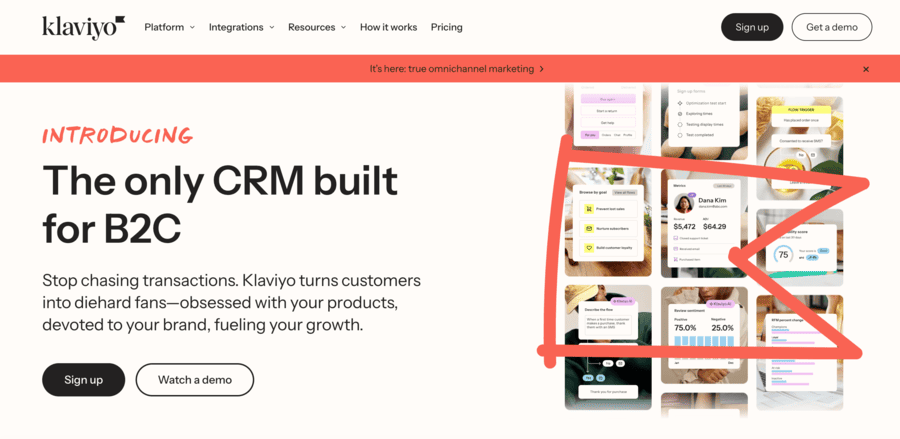
3. Yotpo
Best for: Review management and loyalty program automation
Key features: Automated review requests, sentiment analysis, loyalty program optimization
Pricing: Starts at $29/month
Why it works: Yotpo helps e-commerce brands build trust and boost repeat purchases by automating review collection and loyalty rewards. Its smart sentiment analysis and integrated programs keep customers engaged long after checkout.
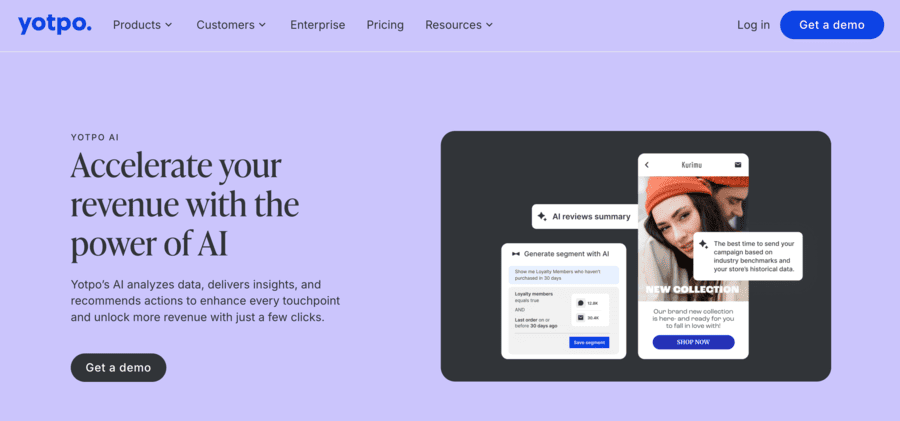
4. Dynamic Yield
Best for: Tailoring website content, layout, and messaging based on user behavior and preferences.
Key features: Real-time content optimization, A/B testing automation, product recommendations.
Pricing: The base package starts at around $35,000 per year, with a free trial available.
Why it works: Dynamic Yield personalizes the entire user journey in real time, from homepage to checkout. Its AI-driven recommendations and automated testing adapt instantly to each visitor, helping brands increase conversions. That said, this is an enterprise-level tool with a price tag to match—best suited for larger e-commerce brands with the budget to invest in advanced personalization.
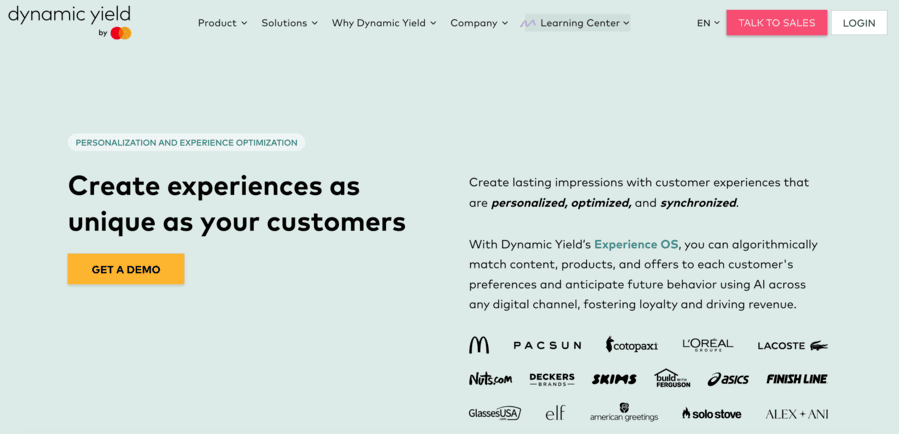
Pro tip: Don't fall into the "shiny object syndrome" trap. Master one AI agent before adding others to your stack. The businesses that succeed focus on implementation, not accumulation.
Step-by-step implementation guide: Your 90-day roadmap
Ready to stop talking and start doing? Here's your proven roadmap to AI agent success:
Days 1-30: Foundation setup
Week 1-2: Assessment and planning
- Audit your current marketing stack - identify which manual tasks are eating up the most time
- Choose your first AI agent - we recommend starting with ad optimization for the fastest ROI
- Set up proper tracking - ensure your Facebook pixel, Google Analytics, and conversion tracking are bulletproof
- Define success metrics - establish clear KPIs before you start
Weeks 3-4: Initial implementation
- Launch with a limited budget - start with 20% of your ad spend to test performance
- Configure basic automation rules - set spending limits and performance thresholds
- Train your team - ensure everyone understands the new workflow
- Document everything - you'll want to replicate successful strategies
Days 31-60: Optimization Phase
Week 5-6: Performance Analysis
- Compare AI vs manual results - look at CPA (cost per action), CAC (customer acquisition cost), ROAS (return on ad spend), and time savings
- Identify winning strategies - note which campaigns and audiences perform best under AI management
- Gradually increase budget - expand successful campaigns while maintaining oversight
- Address any issues - fine-tune settings based on initial performance
Week 7-8: Expansion
- Add a second AI agent - typically email automation or customer service
- Integrate data sources - connect your AI agents for unified customer insights
- Implement advanced features - utilize predictive analytics and advanced targeting options
- Scale successful campaigns - increase budgets on proven winners
Days 61-90: Scale and Optimize
Week 9-10: Full Migration
- Move the majority of marketing to AI management - maintain human oversight for strategy
- Implement cross-platform integration - connect multiple AI agents for a unified strategy
- Advanced optimization - utilize machine learning insights for marketing campaigns
- Team training on advanced features - ensure your team can leverage full platform capabilities
Week 11-12: Performance Review and Planning
- Comprehensive ROI analysis - calculate total time savings and revenue impact
- Plan next expansion phase - identify additional areas for AI implementation
- Optimize team workflows - restructure roles to focus on strategy and growth
- Set goals for next quarter - establish new targets based on AI-enhanced capabilities
Reality check: Most businesses experience initial improvements within 2-3 weeks, but the real magic happens after 60 days, when the AI has sufficient data to make sophisticated optimizations.
Measuring AI Agent ROI and Performance
Here's how to prove your AI agents are actually working (and not just burning through your budget):
Key metrics that matter
Time savings metrics:
- Hours per week freed up from manual campaign management
- Reduction in time spent on routine optimization tasks
- Faster response times to market changes
Revenue impact metrics:
- Month-over-month sales growth
- Improvement in customer lifetime value
- Increase in average order value
Efficiency metrics:
- Reduction in customer acquisition cost and cost per action
- Improvement in return on ad spend (ROAS)
- Better conversion rates across all channels
Customer experience metrics:
- Faster response times to customer inquiries
- Improved email open and click-through rates
- Higher customer satisfaction scores
Expected results timeline
Week 1-2: Initial setup and AI learning period (expect some fluctuation)
Week 3-4: First measurable improvements become visible
Months 2-3: Significant ROI becomes apparent
Month 6+: Compound benefits and advanced optimization deliver sustained growth
Real business numbers: Klarna’s AI-driven marketing approach has reduced costs by 37%, resulting in annual savings of around $10 million.
Common mistakes that cost thousands (and how to avoid them)
Learn from others' expensive mistakes so you don't have to make them yourself:
Mistake #1: The "automate everything" trap
What happens: Businesses attempt to implement AI agents across every marketing channel simultaneously, resulting in chaos and confusion.
The fix: Start with one high-impact area (usually ad optimization) and expand gradually once you've mastered the first implementation.
Mistake #2: Setting it and forgetting it
What happens: Assuming AI agents work perfectly without any human oversight or optimization.
The fix: Schedule weekly performance reviews and monthly strategy sessions to ensure AI decisions align with business goals.
Mistake #3: Garbage data in, garbage results out
What happens: Implementing AI agents without ensuring clean, accurate data feeds for training.
The fix: Audit your tracking setup, clean your customer data, and ensure proper attribution before launching AI agents.
Mistake #4: Expecting instant magic
What happens: Getting impatient when AI agents don't deliver immediate results and abandoning the strategy too early.
The fix: Allow 30-60 days for AI learning and optimization to occur. The best results are achieved when the AI has sufficient data to identify patterns.
Mistake #5: Ignoring the human element
What happens: Removing human creativity and strategic thinking from the marketing process entirely.
The fix: Utilize AI agents to handle optimization and execution, while humans concentrate on strategy, creative development, and business growth.
FAQ: Your burning questions answered
How much does it cost to implement AI agents for e-commerce?
Entry-level AI agents start at around $99/month (like Madgicx's AI Marketer), while enterprise solutions can cost $500-$2000/month. Most e-commerce businesses achieve a positive ROI within 60-90 days, making the investment worthwhile for stores with a monthly revenue of $10,000 or more. The key is to start with one tool and expand based on the results.
Do I need technical skills to set up AI agents?
Absolutely not! Modern AI agent platforms are designed for non-technical users with guided setup processes, templates, and customer support. If you can set up a Facebook ad campaign, you can implement AI agents. Most platforms offer onboarding support to ensure successful implementation.
Will AI agents replace my marketing team?
AI agents enhance your team rather than replace them. They handle repetitive optimization tasks, data analysis, and routine decisions, freeing your team to focus on strategy, creative development, and business growth. Think of them as super-powered assistants that make your team more effective.
How do I know if AI agents are actually working?
Track key metrics like cost per action, customer acquisition cost, return on ad spend, conversion rates, and time savings. Most platforms provide clear before/after comparisons and performance dashboards. You should see measurable improvements within 30-60 days, with significant results by the end of the third month.
What happens if the AI agent makes bad decisions?
Quality AI agent platforms incorporate safeguards such as spending limits, performance thresholds, and human oversight options. You maintain ultimate control while benefiting from automated optimization. Begin with conservative settings and gradually expand as you gain confidence in the system.
Can AI agents work with my existing marketing tools?
Most modern AI agents integrate with popular e-commerce platforms, such as Shopify, email marketing tools like Klaviyo, and advertising platforms like Facebook and Google. Verify the integration capabilities of your AI agent before making a choice to ensure a seamless workflow.
Your next step to AI-powered growth
Here's the bottom line: AI agents aren't just the future of e-commerce marketing - they're the present reality that's helping smart business owners scale faster while working less. The statistics don't lie: by the end of 2025, 85% of enterprises will utilize AI agents, and those that start now will have a significant competitive advantage.
Your key takeaways:
- AI agents deliver up to 80% productivity boosts compared to manual management
- Start with ad optimization for fastest ROI, then expand to email marketing and customer service
- Implementation takes 30-90 days, but typically pays for itself within 60 days
- Focus on mastering one tool at a time rather than trying to automate everything simultaneously
- The biggest mistake is waiting for "perfect" conditions - start now with conservative settings
The reality check: While your competitors are still manually optimizing campaigns and burning out their teams, you could be leveraging AI for business growth that works around the clock. The question isn't whether AI agents will transform e-commerce marketing - it's whether you'll be leading the transformation or playing catch-up.
Your next step: Don't wait for your competitors to gain the AI advantage. Start with one AI agent today - whether it's automating your Facebook ads with Madgicx's AI Marketer or streamlining your email campaigns. The sooner you begin, the sooner you'll wonder how you ever managed without it.
Ready to let AI handle the heavy lifting while you focus on growing your business? Your future self (and your bank account) will thank you for starting today.
Madgicx’s AI Ad Generator enables you to generate high-quality Meta creatives in bulk. Once they’re live, the AI Marketer keeps an eye on performance 24/7 and flags smart tweaks—so every cent of your budget pulls its weight.
Digital copywriter with a passion for sculpting words that resonate in a digital age.




.jpg)


.avif)







